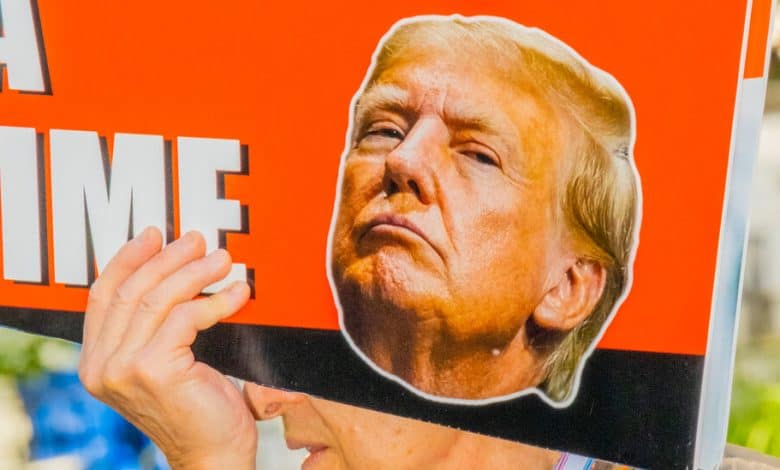Trump Could Soon Be a Felon. Does It Matter?

If I’d pictured Donald Trump’s first criminal trial a few years ago, I’d have imagined the biggest, splashiest story in the world. Instead, as we lurch toward a verdict that could brand the presumptive Republican nominee a felon and possibly even send him to prison, a strange sense of anticlimax hangs over the whole affair.
In a recent Yahoo News/YouGov poll, only 16 percent of respondents said they were following the trial very closely, with an additional 32 percent following it “somewhat” closely. “Those numbers rank as some of the lowest for any recent news event,” wrote Yahoo News’s Andrew Romano. When people were asked how the trial made them feel, the most common response was “bored.” TV ratings tell a similar story. “Network coverage of Donald Trump’s hush money trial has failed to produce blockbuster viewership,” Deadline reported at the end of April. Cable news networks, Deadline said, saw a decline in ratings among those 25 to 54 since the same time last year. At the courthouse last week, I met news junkies who’d lined up at 3 a.m. to get a seat at the trial and maybe score selfies with their favorite MSNBC personalities, but it felt more like wandering into a subcultural fandom than the red-hot center of the zeitgeist. A block or so away, you wouldn’t know anything out of the ordinary was happening.
Perhaps the trial would have captured more of the public’s attention had it been televised, but lack of visuals alone doesn’t explain America’s collective shrug. The special counsel Robert Mueller’s report didn’t have images, either, but when it was published, famous actors like Robert DeNiro, Rosie Perez and Laurence Fishburne starred in a video breaking it down. I’m aware of no similar effort to dramatize this trial’s testimony, and I almost never hear ordinary people talking about it. “Saturday Night Live” tried, last weekend, to satirize the scene at the courthouse with a cold open mocking Trump’s hallway press appearances, but it ended with an acknowledgment of public exhaustion: “Just remember, if you’re tired of hearing about all of my trials, all you’ve got to do is vote for me, and it will all go away.”
It wasn’t a particularly funny line, but it gets at something true that helps explain why this historic trial doesn’t seem like that big a deal. When Trump was president, his opponents lionized lawyers and prosecutors — often in ways that feel retrospectively mortifying — because liberals had faith that the law could restrain him. That faith, however, has become increasingly impossible to sustain.
Mueller punted on the question of whether Trump obstructed justice in trying to impede the Russia probe. The jury in the E. Jean Carroll defamation case found that he committed sexual abuse, but it had little discernible effect on his political prospects. A deeply partisan Supreme Court, still mulling its decision on his near-imperial claims of presidential immunity, has made it highly unlikely that he will face trial before the election for his attempted coup. A deeply partisan judge appointed by Trump has indefinitely postponed his trial for stealing classified documents. With the Georgia election interference case against Trump tied up in an appeal over whether District Attorney Fani Willis should be disqualified over an affair with a member of her team, few expect that trial to start before 2025 — or 2029, if Trump wins the election. And should he become president again, there’s little question that he’ll quash the federal cases against him once and for all.
In theory, the delays in Trump’s other criminal cases should raise the stakes in the New York trial, since it’s the only chance that he will face justice for his colossal corruption before November. But in reality, his record of impunity has created a kind of fatalism in his opponents, as well as outsize confidence among his supporters. In a recent New York Times/Siena poll, 53 percent of voters in swing states said it was somewhat or very unlikely that Trump would be found guilty. That included 66 percent of Republicans but also 42 percent of Democrats.